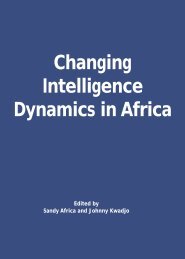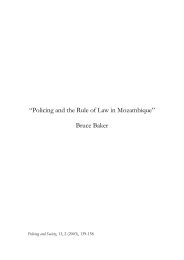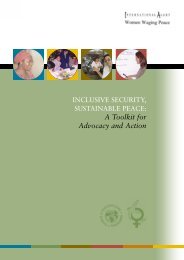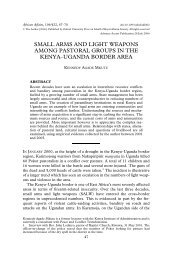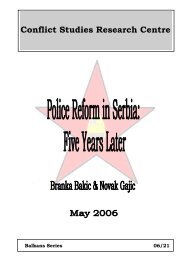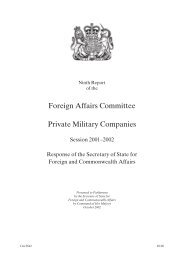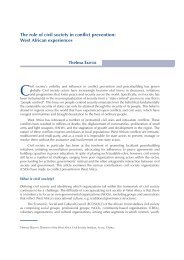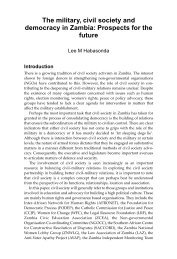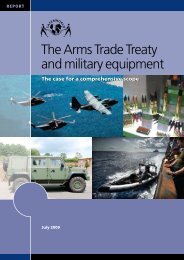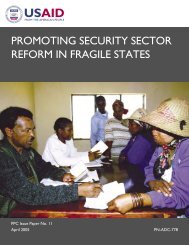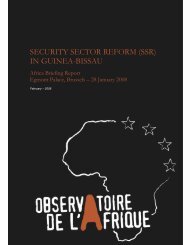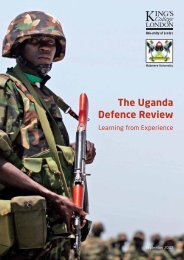AFGHANISTAN'S ELECTION CHALLENGES
AFGHANISTAN'S ELECTION CHALLENGES
AFGHANISTAN'S ELECTION CHALLENGES
Create successful ePaper yourself
Turn your PDF publications into a flip-book with our unique Google optimized e-Paper software.
Afghanistan’s Election Challenges<br />
Crisis Group Asia Report N°171, 24 June 2009 Page 24<br />
civilians, whatever the reality of their actions. 181 Taliban<br />
leader Mullah Mohammad Omar called for a boycott,<br />
arguing: “in the name of elections, selection is carried<br />
out in Washington. The figureheads are not the outcome<br />
of your votes but rather selected at the discretion<br />
of those sitting in Washington. Do not expect<br />
these figureheads to be able to assist you – though<br />
you may be bombed a myriad of times”. 182 Other<br />
statements have similarly focused on undermining<br />
perceptions of the process and pointing out “foreign<br />
influence” rather than bloodthirsty threats. A May<br />
2009 release on the Taliban website urged people to:<br />
“avoid taking part because this is just a game by the<br />
occupiers who want to show [an election] to the<br />
world”. 183 Locally, more threatening material has<br />
been found. A night letter distributed widely in Takhar<br />
province in the name of the unknown “Secret Army<br />
of the Mujahidin of the North” demanded that people<br />
not participate: “otherwise the mujahidin will prosecute<br />
and behead you with the sword of truth and consign<br />
you permanently to the pit of hell”. Little is<br />
184<br />
known of the origins of such groups.<br />
ISAF has once again offered in extremis support but<br />
aims to keep in the background. 185 The promised<br />
21,000 additional U.S. troops are supposed to be in<br />
place before the election – their impending arrival one<br />
of the reasons for the poll delay. Thousands more<br />
temporary troops have been pledged by other allies<br />
for the election period, although it is unclear whether<br />
they will stay past 2009. 186 The ANP was to guard the<br />
polling stations with ANA meant to form a second<br />
perimeter of defence, but given the shortage of police<br />
there will probably be a mixture of the two in the least<br />
secure areas. Indeed the process has highlighted the<br />
181 See Crisis Group Report, Taliban Propaganda: Winning<br />
the War of Words?, op. cit.<br />
182 “Message of the Esteemed Amir ul-Momineen Mullah<br />
Mohammad Omar Mujahid, on the eve of Eid ul-Adha”, Al<br />
Emarah website, 8 December 2008.<br />
183 “Press statement of the head of the political commission<br />
lack of police on the ground. 187 During voter registration<br />
in Kandahar, for example, twelve ANP were<br />
meant to be at each centre when in reality there were<br />
only two or three. 188<br />
Polling centres will be even more spread out; in Paktia<br />
province, for example, there are estimates of only<br />
about 30 police in some districts. 189 This has increased<br />
pressure to bolster police numbers with the interior<br />
minister proposing to induct an additional 4,800 police<br />
in Kabul and another 10,000 nationwide, to receive<br />
only three weeks’ training before the August elections<br />
– and the balance of instruction later. 190 These elections<br />
must feed into wider security sector reform, not<br />
undermine it. If police are quickly hired now, there<br />
needs to be a clear schedule to ensure they receive full<br />
training as soon as possible after these polls – certainly<br />
before the 2010 elections – and that there are<br />
sufficient funds to retain them.<br />
Security efforts on the election days should not solely<br />
focus on the south and other insurgency-hit areas.<br />
With the large number of candidates and parties, some<br />
northern provinces are more likely to see public order<br />
problems. While considerable planning has taken<br />
place, there is still a need for much greater urgency.<br />
staff nationwide. In the current round of elections, it<br />
seems likely that the UN will have to step up its support,<br />
Mullah Abdul Latif Mansoor”, Al Emarah website, 5 May instead of the initially envisaged hands-off approach.<br />
2009.<br />
184 “Warning!”, night letter distributed in several districts of<br />
Takhar, April 2009.<br />
185 Renewing ISAF’s mandate, UNSC Resolution 1833, 22<br />
September 2008, noted: “the leading role that the Afghan<br />
Authorities will play for the organisation of the next presidential<br />
elections with the assistance of the United Nations,<br />
and stressing the importance of the assistance to be provided<br />
to the Afghan Authorities by ISAF in ensuring a se-<br />
cure environment conducive to the elections”.<br />
186 Crisis Group telephone interview, NATO official, Brussels,<br />
19 June 2009.<br />
C. 16ENSURING ROBUST PROCESSES<br />
An electoral process is only as good as the environment<br />
it takes place within and the electoral bodies<br />
driving and safeguarding it. A fair campaign period,<br />
the conduct on voting day itself, and the count and<br />
certification of results will determine the legitimacy<br />
of these elections. These need to be of a technically<br />
high standard, administered fairly, with robust oversight<br />
and impartial adjudicators, if public confidence<br />
is to be upheld. A system with thousands of individual<br />
candidates and limited local literacy and numerical<br />
capacity make this process all the more complicated.<br />
Ongoing training initiatives need to be implemented<br />
and maintained, with a substantial core of electoral<br />
187 An average of eight police per polling centre would mean<br />
56,000 officers – a number few believe exist – before any of<br />
their other work is even taken into account.<br />
188 Crisis Group interview, security official, Kandahar, 18<br />
March 2009.<br />
189 Crisis Group interview, security officials, Gardez, 4<br />
April 2009.<br />
190 11th JCMB, Summary of Proceedings, 19 April 2009,<br />
pp. 3-4.



